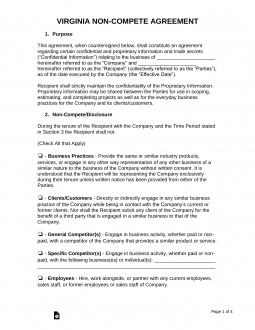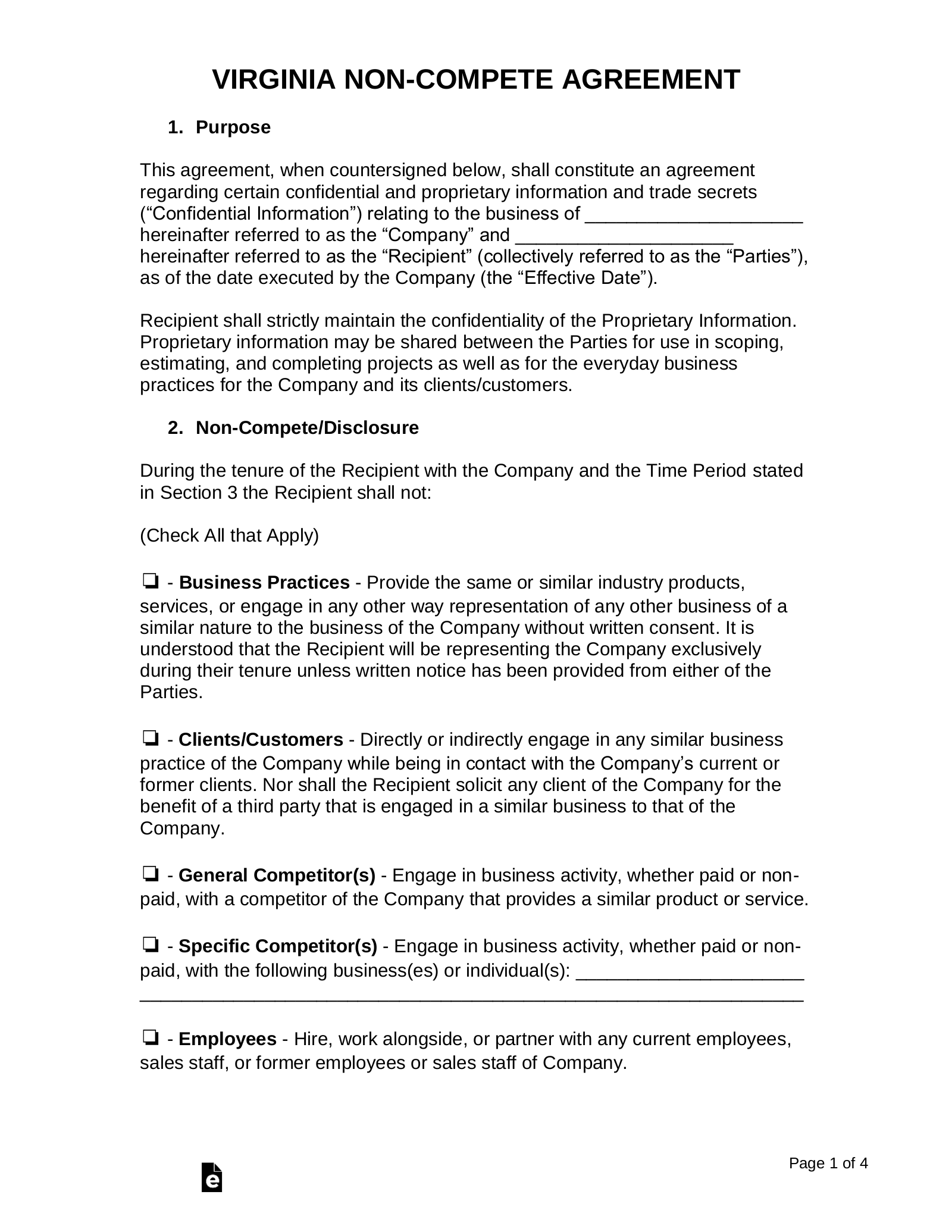Updated February 28, 2024
A Virginia non-compete agreement restricts the ability of an employee from competing with their former employer. A non-compete is required to be for a specific time period, geographical area, and scope of activity. It is prohibited to enter into a non-compete with a low-wage employee or licensed attorney.
A non-compete must be “reasonable” while protecting the interests of the business and not be unduly harsh or oppressive to the employee.
Laws
Legally Enforceable?
Yes, a non-compete is legal in Virginia except for “low-wage employees” and licensed attorneys.[1][2]
Low-Wage Employees
A “low wage employee” is described as a worker that earns “less than the average weekly wage of the Commonwealth.” The calculation is in accordance with VA Code § 65.2-500(b) and is reported quarterly at the Virginia Employment Commission.
Other Types
A “low wage employee” also includes:
- Interns
- Students
- Apprentices
- Trainees (employed)
Such positions can be with or without pay, at a trade or occupation in order to gain work or educational experience.
Penalties
If an employer decides to enter into a non-compete with a low-wage employee, they can be charged a civil penalty of $10,000 for each violation.
Civil Action
A low-wage employee may bring civil action to a court if an employer attempts to enforce a non-compete on them. Such a case must be filed within 2 years of:[1]
- Date the non-compete was signed;
- Date the low-wage employee learns of the non-compete;
- Date the employment relationship is terminated; or
- Date the employer takes any step to enforce the non-compete.
Other Requirements
When determining a non-compete, a court will evaluate 3 requirements for every agreement:
- Legitimate business interest. No greater than necessary to protect a legitimate business interest;
- Not harsh or oppressive. Not unduly harsh or oppressive in curtailing an employee’s ability to earn a livelihood; and
- Public policy. Is reasonable in light of sound public policy.
The employer bears the burden of proving the above factors.[3]
Determining “Reasonable”
In determining an employer’s claims, a court will use 3 factors to determine if a non-compete is reasonable:[4]
- Time period. The length of time the employee is held under the non-compete;
- Geographical area. The areas the employee is prohibited from engaging in the same business; and
- Legitimate business interests. If the non-compete is no greater than necessary to protect the employer’s business interests.
Continued Employment
If an employee is already working and is asked to sign a non-compete, the promise of continued employment is viewed as sufficient consideration.[5]
Maximum Term
When selecting the time period and geographical area for a non-compete, keep in mind that the Supreme Court views “function, geographic scope, and duration” as elements of the restriction.[6]
Employment
For the purposes of employment, 3 years has been determined reasonable. Although, in this specific case was only for a 1-mile radius. (Saks Fifth Avenue v. James, LTD (2006))
For larger geographical areas, 1 year and 60 miles has been deemed reasonable (New River Media Group, Inc. v. Knighton (1993))
In addition, 1 year and 50 miles have been deemed reasonable. (Update, Inc. v. Samilow (2018))
Sale of a Business
5 years and a 100-miles was deemed reasonable. (Musselman v. Glass Works (2000))
Partnership Dissolution
When dissolving a partnership, a non-compete period of 5 years was determined to be reasonable (Meissel v. Finley (1956)).
Blue Penciling
There is no record of a Supreme Court ruling that modified a non-compete restraint. In fact, the courts have made it a rule to specifically not “blue pencil” and amend overbroad or unreasonable agreements.
Source: Lasership, Inc. v. Watson (2009)
“Non to Compete” Definition
“Covenant not to compete” means a covenant or agreement, including a provision of a contract of employment, between an employer and employee that restrains, prohibits, or otherwise restricts an individual’s ability, following the termination of the individual’s employment, to compete with his former employer.[1]
Sources
- VA Code § 40.1-28.7:8
- Rule 5.6
- Assurance Data, Inc. v. Malyevac (2013)
- Modern Environments, Inc. v. Stinnett (2002)
- Mona Electric Group, Inc. v. Truland Service Corp. (2002)
- Home Paramount Pest Control Comp. v. Shaffer (2011)
- Saks Fifth Avenue v. James, LTD (2006)
- New River Media Group, Inc. v. Knighton (1993)
- Update, Inc. v. Samilow (2018)
- Musselman v. Glass Works (2000)
- Meissel v. Finley (1956)
- Lasership, Inc. v. Watson (2009)


